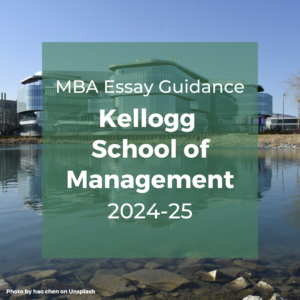2025-26 MBA Admissions: Trends Defining the Class of 2028
October 1, 2025
Read MoreNovember 5, 2024

Essay 1: Intentionality is a key aspect of what makes our graduates successful Kellogg leaders. Help us understand your journey by articulating your motivations for pursuing an MBA, the specific goals you aim to achieve, and why you believe now is the right moment. Moreover, share why you feel Kellogg is best suited to serve as a catalyst for your career aspirations and what you will contribute to our community of lifelong learners during your time here. (450 words)
Despite its innovative wording, Kellogg’s essay 1 prompt is a traditional Why an MBA/Why Kellogg essay. “Intentionality” simply refers to a preference for applicants who have specific reasons (goals) for needing an MBA versus applicants who just want a break from their careers, miss the learning they enjoyed as undergrads, or are clueless as to their post-MBA careers. Kellogg’s phrase “specific goals” means they do want your best thoughts on where your post-Kellogg career will go immediately after graduating and what your best-case long-term career vision is. This does not mean that you have to state only one short- and/or long-term goal. A Plan A/Plan B approach is fine, but make sure your Plans A and B are relevant to the long-term theme of your post-Kellogg career (e.g., “sustainability,” “AI entrepreneurship”, “professional sports leadership” etc.). Devote a sentence or two to the skills/assets you lack that these goals require and another sentence or two to the Why Now question (versus 2 years ago or 2 years from now). Half the essay at least should be devoted to Why Kellogg: state specific Kellogg resources (not just course names!) that show Kellogg is ideal for someone with your goals. Devote several sentences to sharing some specific ideas about ways you benefit Kellogg’s community. Naming three student clubs you’ll join is not a contribution; stating some value-adds or changes you will bring to those clubs is a contribution.
Essay 2: Kellogg leaders are primed to tackle challenges everywhere, from the boardroom to their neighborhoods. Describe a specific professional experience where you had to make a difficult decision. Reflecting on this experience, identify the values that guided your decision-making process and how it impacted your leadership style. (450 words)
Kellogg has pivoted the focus on its essay 2 – an accomplishment essay — from last year’s emphasis on versatile problem-solving. This year, they are limiting you to a professional experience (which ideally will be an accomplishment you’re proud of), want to explore how your decision-making muscle operated in a specific scenario, want to learn about the values that informed the decision you made, and *also* want you to connect the difficult ‘professional experience’ you wrote about to your leadership (either the leadership you demonstrated in the difficult experience you write about *or* the leadership style you have adopted since that experience). So look for job-related accomplishments not more than 2-3 years old where you had to make a tough choice (if that choice involved ethical/integrity issues, even better) that turned out for the best or at least taught you something. If you led people when you made that choice, wonderful, but if not, explain how the “difficult decision” changed your “leadership style” and perhaps share a quick example illustrating that change. Kellogg’s phrase “identify the values” means they want to see some introspection around your decision-making: what principles, ideals, influences, life experiences shaped the difficult choice you made? Clearly, this is not an easy essay because it requires you to find an accomplishment (hopefully though not necessarily) involving a dilemma or a tough A/B choice where (hopefully) the stakes were high and where (hopefully) you demonstrated some leadership.
Additional Information: We know that life is full of extenuating circumstances. Whether you want to explain gaps in work experience, your choice of recommenders, inconsistent or questionable academic performance or something else, you can use this section to briefly tell us anything we need to know about your application. (280 words)
When writing the additional information essay for Kellogg’s MBA application, keep the following advice in mind to make the most effective use of this opportunity:
The additional information essay is an opportunity to provide context and address any important points that might not be evident from the rest of your application. By using this section wisely and thoughtfully, you can strengthen your overall application and help the admissions committee understand you better.